- Home
- Franklin Horton
Compound Fracture
Compound Fracture Read online
Copyright © 2019 by Franklin Horton
Cover by Deranged Doctor Design
Editing by Felicia Sullivan
All rights reserved.
No part of this book may be reproduced in any form or by any electronic or mechanical means, including information storage and retrieval systems, without written permission from the author, except for the use of brief quotations in a book review.
Created with Vellum
Contents
Also by Franklin Horton
About the Author
Chapter 1
Chapter 2
Chapter 3
Chapter 4
Chapter 5
Chapter 6
Chapter 7
Chapter 8
Chapter 9
Chapter 10
Chapter 11
Chapter 12
Chapter 13
Chapter 14
Chapter 15
Chapter 16
Chapter 17
Chapter 18
Chapter 19
Chapter 20
Chapter 21
Chapter 22
Chapter 23
Chapter 24
Chapter 25
Chapter 26
Chapter 27
Chapter 28
Chapter 29
Chapter 30
Chapter 31
Chapter 32
Chapter 33
Chapter 34
Chapter 35
Chapter 36
Chapter 37
Chapter 38
Chapter 39
Chapter 40
Chapter 41
Chapter 42
Bonus Content
Meet The Mad Mick
Also by Franklin Horton
The Borrowed World Series
The Borrowed World
Ashes of the Unspeakable
Legion of Despair
No Time For Mourning
Valley of Vengeance
Switched On
The Locker Nine Series
Locker Nine
Grace Under Fire
The Mad Mick Series
The Mad Mick
Masters of Mayhem
Stand-Alone Novels
Random Acts
About the Author
Franklin Horton lives and writes in the mountains of Southwestern Virginia. He is the author of several bestselling post-apocalyptic series. You can follow him on his website at franklinhorton.com. While you’re there please sign up for his mailing list for updates, event schedule, book recommendations, and discounts.
1
Robert Hardwick’s eyes snapped open and he immediately checked his watch. It was 5:25 AM. He decided he might as well get up since his alarm would be going off in five minutes anyway. He was never one for lingering in bed. He wrestled free of the blankets, sat up in bed, and glanced out the window. The curtain-less window looked out onto the southern Appalachians and he found only the palest glow at the eastern edge of his view. The sun wasn’t up yet and there was no reason Robert had to be either but he couldn’t break routine. This was when he got up — winter, summer, weekday, weekend, normal life, or not-so-normal life. Like now.
He went to the window, leaned his head against the cool glass, and thought of his family. His wife and son would probably not be awake for hours. His daughter Grace was different, though. She was probably up now, just as he was. He hoped they were all safe and that he would be back with them soon.
Robert was not a person who stepped into his day like it was hot bath water, testing it first with a toe before easing in. Robert dove into his day like a drunk belly-flopping off a diving board, springing from the bed into a state of full wakefulness that drove his wife nuts. She required more time to ease into the day.
Normally, a few weeks ago, his routine would have been to get up, suck down some black coffee, and get in four hours of writing before doing anything else. The world was quieter then and he was better able to resist the temptations of the day — business matters, farm projects, or mountain biking. He’d gone without writing for several days now and it made the world seem wrong. The process of putting down his thoughts, of writing stories that engaged people, helped him process the world around him. It purged demons and emotions alike.
What point was there in writing now? If there was a story here in this broken world, he didn’t know how it would end yet. Would he live to be the narrator or would that responsibility fall to someone else because he died here, far away from his home and family? He didn’t want to think about it. It was a pointless spiral of negativity and pain.
He dressed and went to the kitchen, boiling some water on the gas range for a single cup of coffee. When it was ready, he poured it through a French press, then moved to the back porch, placing the cup on the rail to cool in the chilly morning air. The camp was quiet but he knew he wasn’t the only one awake at this hour. There were men on perimeter security, ready to sound the alarm and shoot back should anyone try to breach the unfenced boundary between this compound and the area controlled by the interlopers.
While his coffee cooled, he dropped to a pushup position, feeling the grit and dust of the floorboards beneath his hands as he knocked out twenty-five pushups. He transitioned to a plank and stayed that way until he felt the muscles of his stomach and lower back start to spasm. From there, he did squats until he felt fire in his legs.
“This the morning routine?” Arthur asked as he came out onto the porch with his own cup of coffee.
“No,” Robert said. “Usually it’s coffee, writing, and exercise after that. Then back to writing in the early afternoon. Everything’s off schedule now.”
Arthur shrugged. “You might as well relax into it. Not a lot can be done about it right now, other than what we’re already doing.”
“Relaxing and accepting aren’t qualities I’m known for. I feel like a caged animal,” Robert said, taking that first, magical sip of strong coffee. “I’m going nuts here. All I can think about is my family. Wondering if they’re safe, if they’re comfortable, if they’re eating well.”
“You’re doing this to yourself,” Arthur said. “Take back control. Rein yourself in. Push the emotional bullshit to the side. Process what’s in front of you and nothing else. Besides, you know they’re okay. You’ve talked to them. Grace and Tom are there now. Everything is going to be fine. You guys will be back together soon and this will just be a footnote in your story.”
Robert laughed. “Push it to the side? Easier said than done.”
“What else is there? What else can you do? We’re in a holding pattern.”
Robert had no answer for that. He took a seat in a creaky wooden chair and sipped his coffee. “Any new developments?”
Arthur leaned casually against a porch post, one hand in his pocket, the other holding a Shark Coast Tactical coffee mug that was always close at hand. He took another sip. “Kevin and I were up late. I think we’ve come up with something. Not sure if it’s a good plan or not but sometimes you just have to shake things up and see what falls out.”
“I think I’m about ready to make another run for home,” Robert said.
“Your call, but I think that’s your emotions talking,” Arthur said. “If you keep butting your head against the wall you’re going to get yourself or Sonyea killed. You’ve been lucky too many times and I think you’re running on borrowed luck now.”
Sonyea was a friend of Robert’s. His daughter Grace had stopped over at her place while finding her way home from school in Oxford, Mississippi. Robert had come to Arthur’s compound to bring Grace home but had stuck around to give Sonyea a few days longer to heal from her wounds. Grace and Sonyea’s son, Tom, were already home, having managed to hitch a ri
de aboard the chopper that delivered Kevin here to the compound. It was killing Robert to be stuck here away from his family but Arthur was right. With Tom and Grace already home, his family would do fine.
“I don’t like it a bit,” Robert said.
Arthur shook his head. “You think I like the feeling of being pinned down like a bug beneath a shoe? You think I like those guys breathing down my neck, waiting for us to make a mistake? Waiting for us to give them an opening?”
“You don’t seem stressed.”
“Because you can’t let it get to you, Robert. You have to get your head right and play the long game.”
“I know it.”
“Then do it. You’re in control. Burn the emotions out of your body. You’re not going to do it with a couple of pushups and a handful of squats.”
“What do you suggest?”
“Go down to the shooting range and tie off to one of those tractor tires. Drag it back and forth for a while. Carry some railroad ties up and down the shooting range. Do something that knocks you in the dirt.”
“I might take you up on it,” Robert said, taking another drink.
“You’ve got to do something, man. You’re wigging out. People are noticing. You’ve got Kevin concerned about your mental health.”
Robert shot to his feet, downed the last of his coffee, and gave Arthur a nod. “I’ll tighten it up, Arthur. You don’t have to worry about me.”
He went back in the kitchen and rinsed his mug out at the sink. The gravity-fed water was not pressurized, coming from an elevated tank near the cabin, but it beat the hell out of hauling water from the creek in buckets. It wasn’t just the fact that he was separated from his family that was bothering him. Robert was a loner. He was a person who spent most of his time either alone or among the trusted circle of his own family. He wasn’t used to having to work in tandem with other people. He wasn’t used to having to arrive at a consensus before making a decision. He was used to doing whatever the heck he wanted, whenever the heck he wanted to. Except now he couldn’t.
Arthur was right. He needed to get himself together. People probably were noticing and concerned that he was a flake. The big bad writer who wrote such engaging stories, such taut action sequences, who didn’t shy from blood and gore, was crumbling under the pressure of a tactical standoff.
Maybe he did need to spend some time dragging tires and toting railroad ties. Maybe he did need to cook the worry and self-doubt out of himself. He stowed the coffee cup and went back outside.
“I’ll be at the range,” Robert said, not slowing as he strode across the porch and skipped down the steps. “I’m going to spend some quality time with your tractor tires.”
Arthur held his mug up in a toast. “Go for it. When you get back, check in at the commo shack. Kevin and I have a little recon operation planned. You might find it interesting.”
2
The communication shack at Arthur Bridges’ compound was a rustic plank building painted in Forest Service green. Corrugated steel panels of a similar color made up the roof. There were two double-hung windows recycled from an old house. The structure wasn't much bigger than a suburban backyard shed. The only hint that the shed held anything interesting was that the window glass was painted flat black.
Arthur, owner of both the property and the shed, had not wanted to include any windows at all but his radio operator friends had assured him that the heat from the equipment would make the shack stifling in summer with no ventilation. The heat could even damage the sensitive electronics. Arthur's compromise was to allow windows on the condition they be blacked out to contain the glow from the electronics after dark.
The shack only had one chair, intended for the single radio operator using the equipment. The room was packed to capacity now, the radio operator surrounded by eager faces waiting for an update from the man they’d just sent beyond the wire. Recon was always risky work. Arthur and his men were aware that the men surrounding them had thermal and night vision capabilities. They’d also heard a .50 caliber sniper rifle, an utterly devastating weapon in capable hands.
The presence of such a rifle, of night vision and thermal gear, did not necessarily imply that the enemy had access to military gear. All of those items could be purchased off-the-shelf at a local gun or sporting goods store. While there had even been some full-auto fire during the brief skirmishes between the compound folks and the outside force, that didn’t mean much either. Most local police departments had access to full-auto weapons now through government re-utilization programs. Whatever select-fire gear these men had probably came from a law enforcement agency with access to military surplus weapons.
The radio operator, a young guy named Carlos, threw a hand up to silence the room even though no one was speaking at the moment. It was purely a reaction. Carlos nodded as he listened. "Roger that," he said. “Jim Beam over.”
"What is it?" Arthur asked. His impatience, his desperation for an update, mirrored the anxiety of everyone else in the room.
"Jim Beam Delta in position," Carlos said calmly, not taking his eyes off the meters, buttons, and LEDs in front of him.
"Remind him to keep under that thermal blanket," Arthur said, nervously flexing the sides of a thin plastic water bottle. It made an irritating crackling sound. He tried moving around, wanting to pace, but there was nowhere to go in the tight quarters.
"He knows that," Kevin said.
Kevin Cole was an old friend of Arthur's and maintained a bug out location at Arthur's compound. As a resident of the Washington, D.C. area, he needed a safe place to go if the shit ever hit the fan. He never really expected it to happen but it had just a short time ago. Kevin packed his toys, flagged down a chopper, and arranged to have himself dropped off at Arthur’s compound.
“It never hurts to remind folks," Arthur pointed out. "I feel a responsibility to look out for my guys."
"Brandon is a sharp kid,” Kevin pointed out. “He’s obsessive about details. He’ll be fine."
Arthur shrugged and conceded the point, though the whole thing left him a little uneasy. Weapons and tactics had always been a hobby for Arthur, never his trade and profession. When it came to operations like this he had to trust the people among his group with operational backgrounds. This was their sandbox.
Arthur came from a construction background, having built high-end safe rooms and secure vaults for people in the Washington, D.C. area. It was amazing how many people needed such things and what they were willing to pay for them. A lot of his work had been for upper-echelon folks employed by the government’s intelligence agencies. In those cases, the government often picked up the tab for his work, allowing Arthur the pleasure of recouping a portion of his tax money by sticking it to the government.
It was an eye-opening experience for him. The more he worked with people in the military and security fields, the more he learned just how precarious the security of the United States was. Arthur began thinking seriously about building a secure bug out retreat in the Appalachian Mountains. He’d grown up there and felt it was one of the safer places on the East Coast. When he realized he wouldn't have enough money to do what he wanted on his own, he broached the topic with other like-minded folks and began to build a network of people who wanted in on the project.
Arthur was highly organized and made the decision to set up his retreat as a corporation, allowing people to buy in at different levels. Some levels of ownership bought you a cabin on the property, which Arthur would build to suit your needs. Other tiers of ownership allowed you to cache a shipping container of goods on the property and stay in communal bunkhouses. Regardless of the level you bought into, all the paperwork made it clear that Arthur was in charge. This was his baby. He made the rules. He surrounded himself with people with an array of useful skills and experience and he sought their input, but they had to understand that every final call rested with him.
Carlos touched his headphones, listening, then relayed the info to the group. "He’s in posi
tion with eyes on.”
The forward observer they’d dispatched from the compound was armed but his primary tool was a spotting scope that would allow him to collect intelligence on the opposing force. The scope was equipped with a killflash, a specially-designed screen that prevented light from reflecting off the optic and giving away his position.
Kevin placed his hand on the radio operator’s shoulder. "Remind him I don't want analysis, just a description. He should start video immediately."
Carlos repeated the message, touched a button, and twisted the volume knob. The observer's voice began pouring out of the loudspeakers in the commo shack. He was whispering so the volume was turned up enough that everyone could hear what he was saying. No one in the room spoke, afraid they would miss a detail.
“I've got one RV. It’s huge. Like the size of a tour bus. Behind it there’s a line of vehicles stretching down the road. I can’t see how far the line goes because of the trees. There are other campers of different sizes. Some are trailers, like you’d pull with a truck, but they’ve been unhooked from their trucks. There's at least a half-dozen individual vehicles—Jeeps, SUVs, and pickup trucks. Most are seriously loaded down with gear. They have shit tied to the tops and packed into every available space.”
"Does he see any people?" Arthur asked. It was nearly 8 AM. Surely there were people out there moving around already.

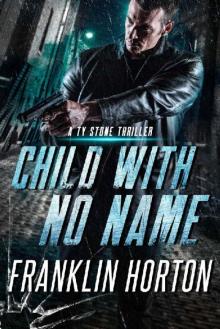 Child With No Name
Child With No Name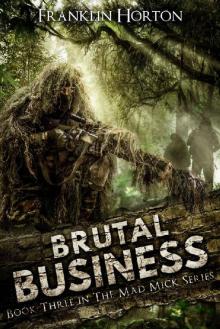 Brutal Business: Book Three in the Mad Mick Series
Brutal Business: Book Three in the Mad Mick Series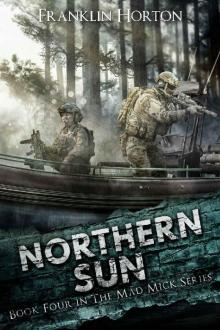 Northern Sun: Book Four in The Mad Mick Series
Northern Sun: Book Four in The Mad Mick Series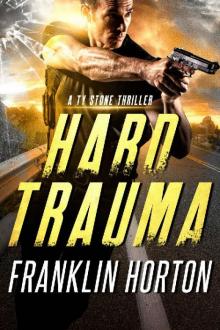 Hard Trauma
Hard Trauma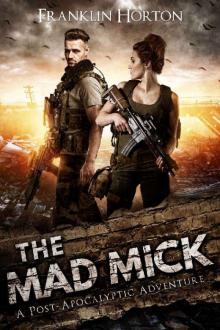 The Mad Mick: Book One of The Mad Mick Series
The Mad Mick: Book One of The Mad Mick Series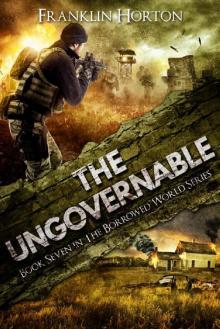 The Ungovernable
The Ungovernable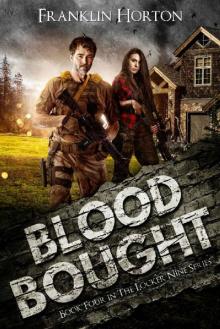 Blood Bought: Book Four in The Locker Nine Series
Blood Bought: Book Four in The Locker Nine Series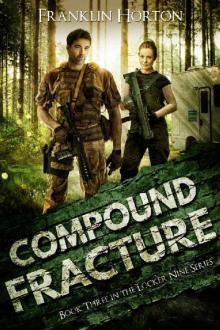 Compound Fracture
Compound Fracture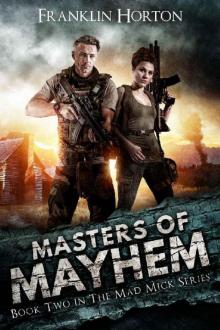 Masters of Mayhem
Masters of Mayhem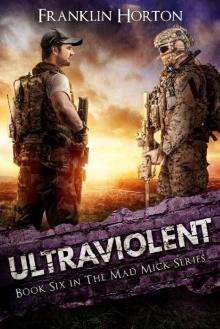 Ultraviolent: Book Six in The Mad Mick Series
Ultraviolent: Book Six in The Mad Mick Series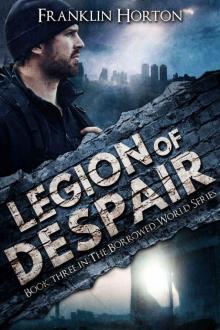 The Borrowed World (Book 3): Legion of Despair
The Borrowed World (Book 3): Legion of Despair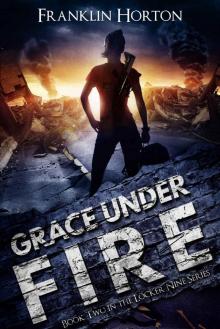 Grace Under Fire: Book Two In The Locker Nine Series
Grace Under Fire: Book Two In The Locker Nine Series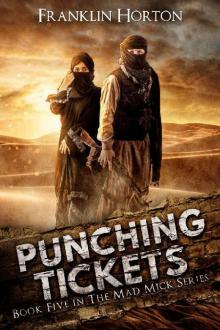 Punching Tickets: Book Five in The Mad Mick Series
Punching Tickets: Book Five in The Mad Mick Series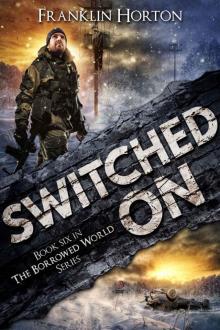 Switched On: Book Six in The Borrowed World Series
Switched On: Book Six in The Borrowed World Series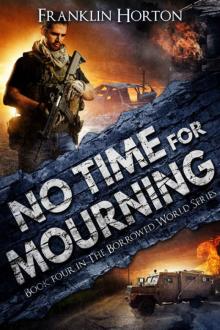 No Time For Mourning: Book Four in The Borrowed World Series
No Time For Mourning: Book Four in The Borrowed World Series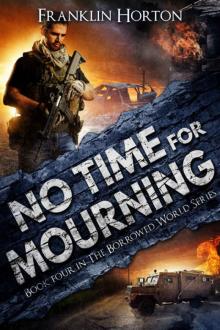 The Borrowed World (Book 4): No Time For Mourning
The Borrowed World (Book 4): No Time For Mourning Random Acts
Random Acts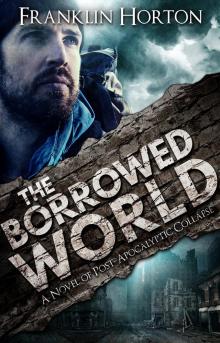 The Borrowed World: A Novel of Post-Apocalyptic Collapse
The Borrowed World: A Novel of Post-Apocalyptic Collapse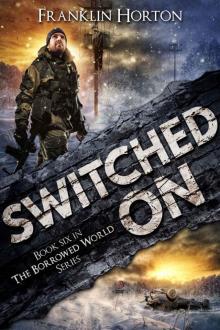 Switched On
Switched On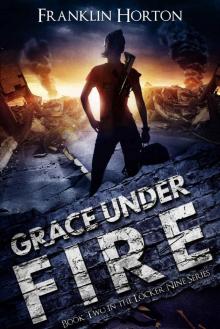 Grace Under Fire
Grace Under Fire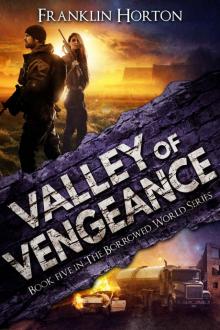 Valley of Vengeance: Book Five in The Borrowed World Series
Valley of Vengeance: Book Five in The Borrowed World Series